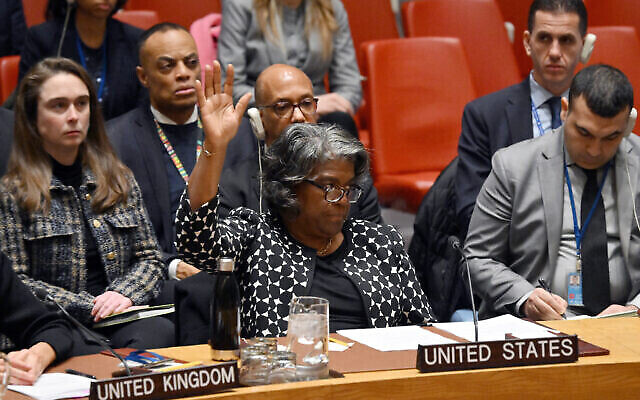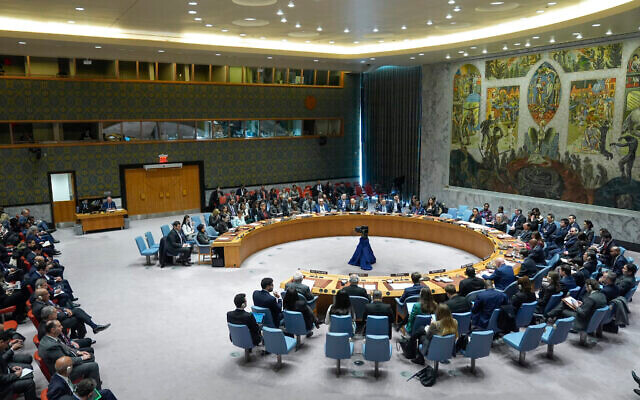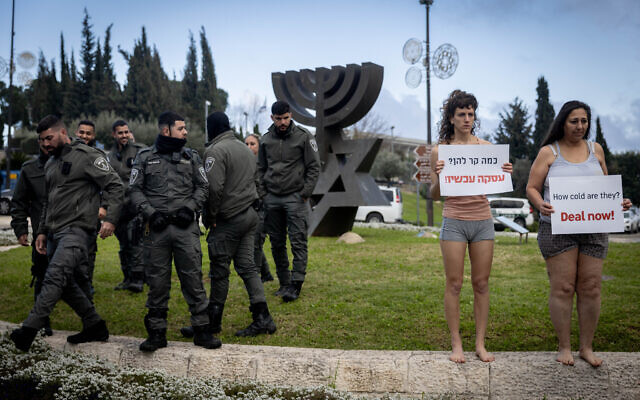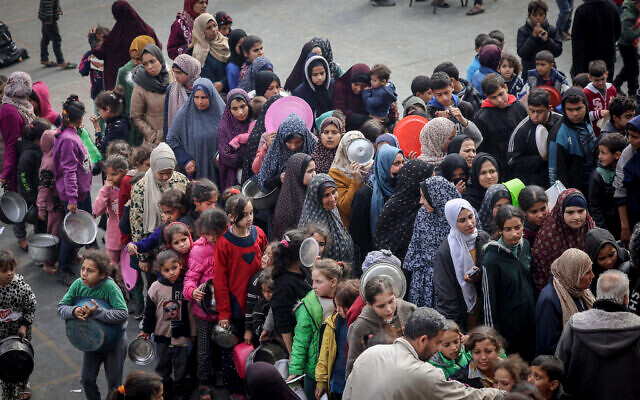US vetoes Security Council resolution demanding immediate ceasefire in Gaza war
Veto of Algerian-drafted text is the third time Washington has blocked resolutions since outbreak of fighting as Washington pushes alternative draft; UK abstains in 13-1 vote.

(THE TIMES OF ISRAEL) The United States vetoed an Arab-backed UN resolution Tuesday demanding an immediate humanitarian ceasefire in the Israel-Hamas war in the Gaza Strip.
The vote in the 15-member Security Council was 13-1, with the United Kingdom abstaining, reflecting the wide support for ending the more than four-month war that started with Hamas’s surprise invasion of southern Israel that killed about 1,200 people, most of them civilians, and saw 253 others taken hostage.
It was the third US veto of a Security Council resolution demanding a ceasefire in Gaza.
The Biden administration had said it would veto the resolution because of concerns it would interfere with efforts to arrange a deal between the warring parties aimed at bringing at least a six-week halt to hostilities and releasing all hostages.
“We still don’t believe that this is the right time for a general ceasefire that leaves Hamas in control and alleviates any responsibility for them to release the hostages,” White House National Security Council spokesman John Kirby said after the vote. The vetoed resolution did, however, include a call for the “immediate and unconditional release of the hostages.”
n a surprise move days ahead of the vote, the United States circulated a rival UN Security Council resolution that would support a temporary ceasefire in Gaza linked to the release of all hostages, and call for the lifting of all restrictions on the delivery of humanitarian aid. Both of these actions “would help to create the conditions for a sustainable cessation of hostilities,” the draft resolution obtained by The Associated Press says.
US Deputy Ambassador Robert Wood told several reporters Monday that the Arab-backed resolution is not “an effective mechanism for trying to do the three things that we want to see happen — which is get hostages out, more aid in, and a lengthy pause to this conflict.”
With the US draft, “what we’re looking at is another possible option, and we’ll be discussing this with friends going forward,” Wood said. “I don’t think you can expect anything to happen tomorrow.”

A senior US official said later Monday, “We don’t believe in a rush to a vote.” The official, speaking on condition of anonymity ahead of council discussions on the US draft, said, “We intend to engage in the coming days in intensive negotiation around it… That’s why we’re not putting a timeline on a vote, but we do recognize the urgency of the situation.”
Arab nations, supported by many of the 193 UN member countries, have been demanding a ceasefire for months amid mounting Palestinian casualties.
The Hamas-run Gaza health ministry says that more than 29,000 people have been killed. The figures provided by the health ministry cannot be independently verified and include both civilians and Hamas members killed in Gaza, including as a consequence of terror groups’ own rocket misfires. The IDF says it has killed over 12,000 operatives in Gaza, in addition to some 1,000 terrorists inside Israel on October 7.
Tunisia’s UN Ambassador Tarek Ladeb, this month’s chair of the 22-nation Arab Group, told UN reporters last Wednesday that a ceasefire is urgently needed.
He pointed to some 1.5 million Palestinians who sought safety in Gaza’s southern city of Rafah and face a “catastrophic scenario” if Prime Minister Benjamin Netanyahu goes ahead with his announced plan to evacuate civilians from the city and move Israel’s military offensive to the area bordering Egypt, where Israel says Hamas has its final stronghold.
In addition to a ceasefire now, the Arab-backed resolution rejected the forced displacement of Palestinian civilians, called for unhindered humanitarian access throughout Gaza and reiterated council demands that Israel and Hamas “scrupulously comply” with international law, especially the protection of civilians. Without naming either party, it condemned “all acts of terrorism.”

The US draft resolution says Israel’s planned major ground offensive in Rafah “should not proceed under current circumstances.” It also warns against further displacement of civilians, “including potentially into neighboring countries,” a reference to Egypt, a move that would likely have serious implications for regional peace and security.
US Ambassador Linda Thomas-Greenfield, in a statement Sunday, explained that the US has been working on a hostage deal for months. She said US President Joe Biden has had multiple calls over the last week with Netanyahu and the leaders of Egypt and Qatar to push the deal forward.
“Though gaps remain, the key elements are on the table,” she said, and the deal remains the best opportunity to free the hostages and have a sustained pause that would enable lifesaving aid to get to needy Palestinians.
The 15 Security Council members have been negotiating on the Arab-backed resolution for three weeks. Algeria, the Arab representative on the council, delayed a vote at Washington’s request while US Secretary of State Antony Blinken was recently in the region, hoping to get a hostage deal. But Qatar said Saturday the talks “have not been progressing as expected,” leading the Arab Group to decide over the weekend that they had given the US enough time and put their resolution in final form for Tuesday’s vote.

What will happen after the US veto remains to be seen. The Arab Group could take their resolution to the UN General Assembly, which includes all 193 UN member nations, where it is virtually certain to be approved. But unlike Security Council resolutions, assembly resolutions are not legally binding.
The Security Council will then likely start discussing the much-lengthier US draft resolution, which would for the first time not only condemn Hamas’s October 7 attack, but its hostage-taking and killing, “murder, and sexual violence including rape.” Some council members blocked the condemnation of Hamas in two previous council resolutions on Gaza.
The US draft doesn’t name Israel, but in a clear reference the draft “condemns calls by government ministers for the resettlement of Gaza and rejects any attempt at demographic or territorial change in Gaza that would violate international law.”
Asked later Tuesday whether the US draft’s call for a “temporary ceasefire” as opposed to a “humanitarian pause” represented a shift in Washington’s stance, US State Department spokesman Matthew Miller indicated that it wasn’t.
“We want to see a temporary stop in the fighting. You can call it a ceasefire, you can call it a pause. Ultimately, we want to see the fight and stop so hostages can get out and humanitarian assistance can get it,” he said during a press briefing.
“The only kind of temporary ceasefire that is going to achieve a release of hostages is one that’s negotiated. Just calling for a temporary ceasefire that Hamas has not agreed to is not going to do anything to get the hostages out, which is why we can continue to pursue diplomacy with Israel and with the governments of Egypt and Qatar to try to and achieve a temporary ceasefire that would secure the release of the hostages.”
“We think that is by far the most productive way forward. It’s what achieved the release of more than 100 hostages last year, and what we think should be the productive path for moving forward now,” Miller added.

comments